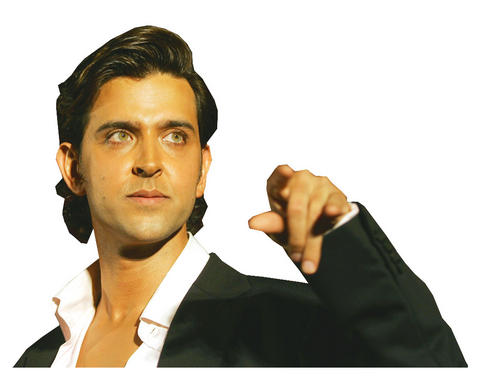The threat of an actors' strike in the months ahead has put movie studios in a tenuous situation. Filmmakers are reluctant to launch any production that cannot be completed before the expiration of the Screen Actors Guild's (SAG) major film and TV contract ends on June 30.
"The studios for the most part are not greenlighting any movies that would have to be in production after that (June 30) deadline," said an insider at one leading talent agency.
Labor jitters have even prompted Hollywood's leading insurance carrier, Fireman's Fund Insurance Co, to offer a first-of-its-kind "strike expense" policy for studios.

PHOTO: AP
In light of strike concerns, Steven Spielberg has called off the April start to a DreamWorks film about the trial of the 1968 anti-war activists, the Chicago Seven, according to Variety.
Michael Bay, director of Transformers, is keeping his fingers crossed as he sticks to an early June start date for a sequel to the movie.
India's Supreme Court on Tuesday lifted state bans on the screening of Jodhaa Akbar, a blockbuster film about the love between a Muslim emperor and his Hindu wife.
Several states last month prohibited cinemas from showing the film after it sparked protests by Hindu Rajputs - a traditional warrior caste - against a "wrong interpretation" of history.
But the court lifted the bans until March 14, when a hearing will receive a petition from the Bollywood film's producers, who say the protests have cost them heavy losses.
Cinemas in western Rajasthan state were the first to refuse to screen the film after threats came from the Rajput community, which says it is grossly inaccurate.
The film - one of the most expensive Bollywood productions with an estimated budget of US$10 million - depicts a romance between the 16th-century Mughal ruler Akbar and Rajput princess Jodha Bai.
Former Miss World Aishwarya Rai portrays Jodha while Akbar is played by Bollywood heartthrob Hrithik Roshan.
In Hollywood, some insiders are scratching their heads over comments by French Oscar winner Marion Cotillard.
"I think we're lied to about a lot of things," Cotillard said during a television program first broadcast last year, which has resurfaced on the Internet.
The actress, who picked up her award for playing Edith Piaf in the French film La Vie en Rose, cited the attacks on New York and Washington in 2001 as one example, adding: "I tend to believe in the conspiracy theory."
Cotillard's lawyer Vincent Toledano said she had "never intended to contest nor question the attacks of Sept. 11, 2001, and regrets the way old remarks have been taken out of context."
Paul Raymond, the porn baron and multi-millionaire property developer credited with staging the first live striptease show in London, has died, his company said Monday. He was 82.
Raymond, who amassed an estimated US$1.2 billion fortune, was once dubbed the "King of Soho" for his businesses, including Raymond's Revue Bar, in the London nightlife district.
His stable of top-shelf magazines, overseen by his company, the Paul Raymond Organisation, included Razzle, Men's World and Mayfair. Born Geoffrey Anthony Quinn, the son of a haulage contractor, Raymond left school at 15 vowing to make his name in show business. He started out with a mind-reading act, before becoming producer for a touring vaudeville show.
For many commentators he brought erotica into the mainstream, hosting a ground-breaking live striptease in 1958, before going on to make a vast fortune by buying and developing property in Soho and west London.
He was also described as a British version of Playboy founder Hugh Heffner in the US.
Bienvenue Chez les Ch'tis (Welcome to the Land of the Ch'tis), a French comedy mocking national stereotypes about the country's north, usually depicted as a bleak, depressed land of beer-swilling brutes, looks set to be the movie of the year in France after smashing box office records.
Released last Wednesday, it has already overtaken France's most costly film ever, Asterix at the Olympic Games, which came out in January.
Films and novels about the area, which is a stark contrast to the glamour of Paris or the sunny mountains and coast of the Riviera, often feature coal mining, unemployment, rain or heavy drinking.
This grim social realist tradition can be traced back to the 19th-century writer Emile Zola and his bleak mining novel Germinal.
But Bienvenue Chez les Ch'tis, written and directed by comedian Danny Boon, a Ch'ti himself who also stars in the movie, satirizes the prejudices about the area to reveal the warmth and big hearts of its people.

May 26 to June 1 When the Qing Dynasty first took control over many parts of Taiwan in 1684, it roughly continued the Kingdom of Tungning’s administrative borders (see below), setting up one prefecture and three counties. The actual area of control covered today’s Chiayi, Tainan and Kaohsiung. The administrative center was in Taiwan Prefecture, in today’s Tainan. But as Han settlement expanded and due to rebellions and other international incidents, the administrative units became more complex. By the time Taiwan became a province of the Qing in 1887, there were three prefectures, eleven counties, three subprefectures and one directly-administered prefecture, with

It’s an enormous dome of colorful glass, something between the Sistine Chapel and a Marc Chagall fresco. And yet, it’s just a subway station. Formosa Boulevard is the heart of Kaohsiung’s mass transit system. In metro terms, it’s modest: the only transfer station in a network with just two lines. But it’s a landmark nonetheless: a civic space that serves as much more than a point of transit. On a hot Sunday, the corridors and vast halls are filled with a market selling everything from second-hand clothes to toys and house decorations. It’s just one of the many events the station hosts,

Through art and storytelling, La Benida Hui empowers children to become environmental heroes, using everything from SpongeBob to microorganisms to reimagine their relationship with nature. “I tell the students that they have superpowers. It needs to be emphasized that their choices can make a difference,” says Hui, an environmental artist and education specialist. For her second year as Badou Elementary’s artist in residence, Hui leads creative lessons on environmental protection, where students reflect on their relationship with nature and transform beach waste into artworks. Standing in lush green hills overlooking the ocean with land extending into the intertidal zone, the school in Keelung

Taiwan Power Co (Taipower, 台電) and the New Taipei City Government in May last year agreed to allow the activation of a spent fuel storage facility for the Jinshan Nuclear Power Plant in Shihmen District (石門). The deal ended eleven years of legal wrangling. According to the Taipower announcement, the city government engaged in repeated delays, failing to approve water and soil conservation plans. Taipower said at the time that plans for another dry storage facility for the Guosheng Nuclear Power Plant in New Taipei City’s Wanli District (萬里) remained stuck in legal limbo. Later that year an agreement was reached